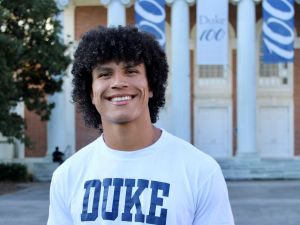In Their Own Words: Languages as a Lifeline
In this series of four stories, we are highlighting students whose “Why I Learn Languages” essays have been selected as winners of the Trinity Language Council’s 2024 Best Essay competition. Damilola Bankole is a junior majoring in Global Health and Spanish. Read and let Bankole tell you, in her own words, how learning languages allows her to translates not only words, but emotions, prayers and hopes.
Language has always been more than a tool for communication to me; it is a gateway to understanding, connection and identity. My journey with languages began as a child, growing up in a multilingual household where English, Yoruba and bits of other languages danced together in our conversations. But it wasn’t until I formally began learning Spanish that I realized the true power of language to bridge divides and foster deeper connections.
As a Global Health and Spanish double major, language learning has been integral to my academic and personal growth. My studies have given me the tools to understand and address health disparities in different communities, particularly in Spanish-speaking regions. Yet, beyond the classroom, my language skills have opened doors to experiences that have shaped who I am today.
This past summer, I had the incredible opportunity to serve as a translator for a medical mission team in Mexico. In this role, I was not just translating words; I was translating emotions, prayers and hopes. I witnessed firsthand how language could be a lifeline, providing comfort and clarity to patients in vulnerable situations. It was a humbling experience that reaffirmed my commitment to using language as a means of service and advocacy.
My journey didn’t stop with Spanish. In my sophomore year of high school, I began learning French, and this has been a significant part of my linguistic journey. Now, I volunteer to teach both French and Spanish, which not only allows me to share my knowledge but also gives me the opportunity to practice and improve my own skills. There’s a saying in Spanish that I learned in high school, "una persona que habla dos lenguas vale por dos" — a person who speaks two languages is worth two. I find this to be profoundly true because the more languages I speak, the more connections I can make, and the more perspectives I can see.
My passion for learning Spanish is also driven by its significance as the second most popular language in the U.S., a language that is rapidly becoming more prevalent. As a future medical doctor, I understand the reality that I will have Spanish-speaking patients. In a healthcare system where there is already a deficit of trust between providers and patients, poor communication only exacerbates this issue. The thought of doctors who cannot even communicate with their Spanish-speaking patients troubles me. I aspire to be a doctor who not only speaks my patient’s language but also understands and appreciates their cultural experiences. This is something that cannot always be conveyed in words but is learned through experiences and a deep commitment to cultural competency.
My research experiences have also highlighted the importance of language in healthcare. Whether it’s studying transitional care for Spanish-speaking patients with traumatic brain injuries or researching sickle-cell disease in Uganda, language plays a critical role in ensuring that patients receive the care they need. My ability to communicate in multiple languages has allowed me to engage with diverse populations and contribute to research that has the potential to make a real difference in people’s lives.
But my passion for language learning goes beyond professional aspirations. It is deeply rooted in my desire to connect with others on a more personal level. When I traveled to Nigeria last Christmas, I was able to communicate with family members I had never met before in both English and Yoruba. This ability to converse in the native tongue allowed me to connect with my roots in a profound way. I felt a deeper understanding of my heritage, culture and the experiences that have shaped my family’s history. One of the most fascinating aspects of learning multiple languages is the realization that some things simply get lost in translation. For example, in Yoruba, there are sayings or phrases that are hard to translate into English. Having an understanding of Yoruba allows me to grasp the deeper meaning behind these expressions.
My aspirations extend further, as I hope to learn Arabic, Korean and Italian before I graduate. I am captivated by the idea of understanding seven languages (not limiting myself to this, of course — I want to learn as much as possible, but at least for now), each one offering a new lens through which to view the world. Language learning has enriched my involvement in various organizations and initiatives. As the co-president and founder of a new organization on campus, Duke Multicultural Organization (DukeMCO), I am working to foster a community of global thinkers who appreciate and respect cultural diversity. I know my language skills will be crucial in breaking down barriers and promoting understanding among members from different backgrounds.
Ultimately, I learn languages because they are a reflection of who I am and whom I aspire to be. Each word I master brings me closer to the people and places I want to understand. In a world that is increasingly interconnected, language is more important than ever. It is a bridge between cultures, a tool for empathy and a key to unlocking the full potential of human connection. My journey with languages has just begun, and I look forward to continuing to explore the rich tapestry of experiences, relationships and opportunities that language learning brings into my life.




